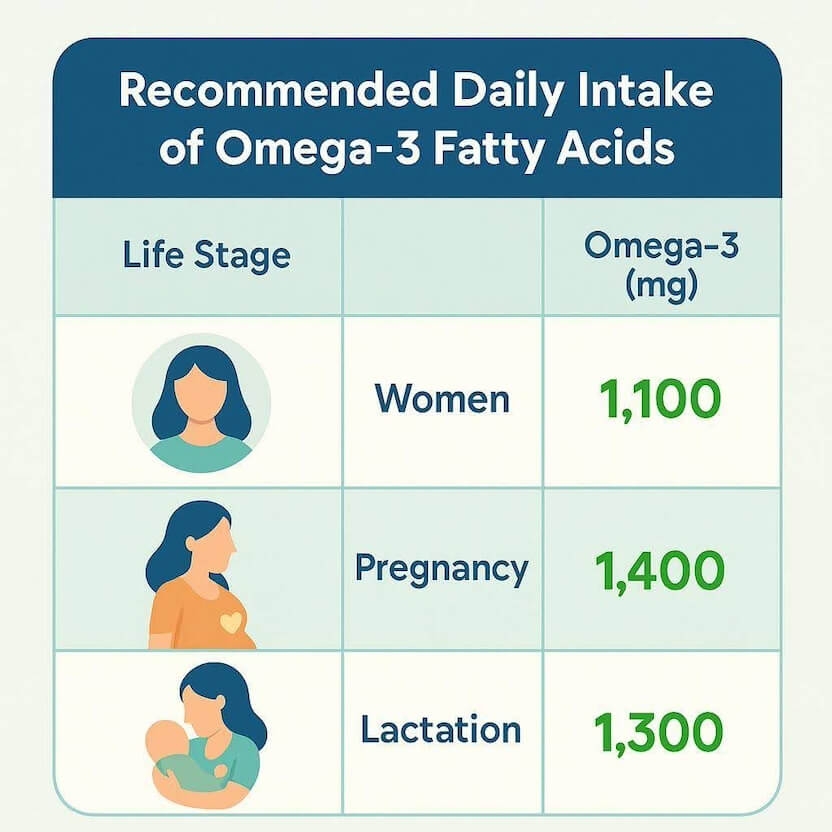Last update: July 30, 2025
7 minute read
Omega 3 Benefits for Women: How Fatty Acids Support Immunity, Positive Mood and Cognitive Health?
Discover omega-3 benefits for women, including immune balance, and positive mood support.

By Derick Rodriguez, Associate Editor
Edited by Dr. Dimitar Marinov, MD, RDN, PhD

You've probably heard that omega-3s are good for you, but do you actually know why they're considered one of nutritionists' top recommendations? Turns out, these essential fats don't just protect your heart; they're strong supporters for cognitive, immune, and mental health.
In this guide, we’ll look at why omega-3s matter for women’s cognitive and immune relief—and how to choose the best sources for real, lasting results.
Key takeaways
- Omega-3 fatty acids are essential fats that support healthy inflammation levels and normal brain function
- Direct EPA & DHA supplementation is recommended due to inefficient conversion from plant-based ALA
- Ease menopause symptoms like hot flashes and mood swings, improving quality of life
Understanding omega-3 fatty acids
To see why these fats matter, let’s start with the basics.
Omega-3 fatty acids are what nutritionists call "essential fats." They're polyunsaturated and important for several bodily functions, but your body can't make them on its own.
This means you have to get them from diet or supplementation. Three major omega-3 fats to know are EPA and DHA, found mainly in fish, and ALA from plant sources like flaxseeds and walnuts.
Still scratching your head about these acronyms?
- EPA (eicosapentaenoic acid): Mainly linked to heart and mood support.
- DHA (docosahexaenoic acid): Important for brain, eye, and nervous system health.
- ALA (alpha-linolenic acid): The plant-based source, acts as a precursor to EPA and DHA, but only a small fraction converts in the body.
— Dr. Dimitar Marinov, MD, RDN, PhDEPA and DHA from marine‑derived omega‑3s integrate into cell membranes throughout the body to support overall health and balanced inflammation levels. While two servings of fatty fish per week or a high‑purity supplement can reliably cover your needs, remember that omega‑3s work best within a broader anti‑inflammatory diet rich in fiber, phytoestrogens, and micronutrients that together promote overall health.
The tricky part? Research shows that converting plant-based ALA into EPA is typically well under 10 %, and conversion to DHA is often below 1 %.
That's why direct EPA and DHA supplementation is your best bet for good hormonal support and overall health.
That said, does this mean plant-based eaters are missing out entirely? Not exactly!
While plant sources are helpful, women who eat little to no seafood might consider algae-based DHA/EPA supplements for a more direct omega-3 boost.
Omega-3s are important for your body
Omega-3 fatty acids play important roles in the body by forming the phospholipids that make up cell membranes and serve as starting points for making hormones that control blood clotting, artery wall contraction and relaxation, and inflammation.
Now that you know omega-3s support many basic processes, you might also be wondering how much is enough for women at different life stages.
For women, recommendations for omega-3 intake vary by age and stage of life. According to established guidelines, the adequate intake (AI) for adult women ages 19-50 is 1.1 g of ALA per day; for pregnant and lactating women it's 1.4 g and 1.3 g, respectively.
See the table below for more details:

Omega-3 adequate intake by age and life stage (female):
Age Group | Recommended Omega-3 AI (Female) |
|---|---|
14–18 years | 1.1 g |
19–50 years | 1.1 g |
51+ years | 1.1 g |
Pregnancy (14–50 yrs) | 1.4 g |
Lactation | 1.3 g |
Source: NIH Office of Dietary Supplements
Let’s look at how those grams translate into real-world benefits.
How omega-3s help cognitive and immune function
Omega‑3 PUFAs (EPA +DHA) have robust anti‑inflammatory effects: an umbrella meta‑analysis of 32 meta‑analyses found that supplementation significantly reduces key markers—C‑reactive protein, TNF‑α, and IL‑6.
Supporting positive mood
Beyond inflammation, omega‑3s—especially EPA ≥ 60% at doses ≤ 1 g/day—show a small but statistically significant benefit on depressive symptoms, with EPA‑focused formulations yielding the greatest improvements.
Omega-3 fatty acids have been connected with better mental well-being, supporting mood, and reducing symptoms of depression and anxiety.
Curious about which symptoms respond best? Research shows omega-3s especially lessen menstrual cramps, breast tenderness, and even some emotional PMS symptoms, boosting both physical and emotional comfort.
Why Vitarx omega-3 supplements are better
High-quality ingredients
VitaRx omega-3 supplements are sourced from premium fish oils, carefully selected for strong doses of EPA and DHA—the strong combination you need.
We look for brands that list specific EPA/DHA amounts, source their oils from wild-caught fish, and offer transparency via third-party purity testing, like VitaRx does.

Get your personalized vitamin recommendations in less than 3 minutes.
Get your personalized vitamin recommendations in less than 3 minutes.

Purity and sustainability
We set higher standards: all VitaRx products go through strict third-party testing. That makes sure there are no contaminants and that the sourcing is environmentally responsible.
Still wondering what "contaminants" means? Common contaminants in lower-grade fish oils include heavy metals (like mercury), PCBs, and dioxins—VitaRx testing makes sure these are removed or below detectable limits.
Optimal dosage and absorption
Not all omega-3 supplements are equal. VitaRx's supplements provide omega-3 fatty acids in phospholipid and re-esterified triacylglycerol forms, delivery formats that have been associated with improved absorption compared with some ethyl-ester products.
In plain English, this means: When you take VitaRx, more of each capsule’s omega-3 actually gets into your bloodstream compared to standard ethyl ester formulas—a big plus for women aiming for real results.
VitaRx vs. competitors
When comparing omega-3 supplements, what truly matters is purity, concentration, sustainability, and absorption.
VitaRx hits every benchmark, giving higher concentrations of EPA and DHA while strictly making sure of purity and sustainability in every dose.
Still curious how competitors stack up? Here’s a quick look:
Criteria | VitaRx Omega-3 | Typical Competitor |
|---|---|---|
EPA/DHA Level | High | Moderate–Low |
Purity Tested | Yes, 3rd party | Not always |
Absorbable Form | Yes | Sometimes |
Sustainability | Yes | Varies |
Purified supplements are mercury-free!
Despite concerns about mercury in fish, purified fish oil supplements contain almost no mercury, making them a safe option for those wanting omega-3 benefits without the contaminants found in certain fish species.
How to naturally add omega-3s into your routine
Dietary sources
Add foods rich in omega-3 naturally: salmon, sardines, trout, flaxseeds, walnuts, and chia seeds. Aim for at least two servings of fatty fish per week, as recommended by experts. Fatty fish are among the richest sources.
Want a cheat sheet for vegetarian options?
- Chia seeds, flaxseeds, and walnuts are the best plant-based ways to get ALA.
- For direct DHA/EPA, consider algae oil supplements if you’re avoiding fish.
Food Source | Omega-3 Content (per 3 oz/85g serving) |
|---|---|
Salmon | 733–952 mg (EPA+DHA) |
Sardines | High |
Trout | High |
Walnuts (1 oz) | 2,570 mg (ALA) |
Chia seeds (1 oz) | 5,055 mg (ALA) |
Flaxseeds (1 oz) | 6,388 mg (ALA) |
Still wondering how much is too much? Regulatory agencies like the U.S. FDA advise limiting combined EPA and DHA intake from all sources to about 3 g per day (with no more than 2 g coming from supplements) to minimize potential side effects such as increased bleeding risk.
Supplementation
For consistency and strength, add VitaRx omega-3 supplements to your daily routine. This makes sure you reach recommended omega-3 intakes needed for the best benefits like immune balance, anti-inflammatory protection, and long-term wellness.
Not sure when to take omega-3 supplements? Taking omega-3s with meals (especially ones with healthy fats) can further help their absorption and minimize any fishy aftertaste.
For more trusted reading on the importance of omega-3s for women's health, visit the NIH Omega-3 Fact Sheet for Health Professionals.
Frequently asked questions (FAQ)
Here are some of the most frequently asked questions about omega-3 benefits.
Final thoughts
Survey data suggest that fewer than 10 % of U.S. Women meet omega-3 intake recommendations, yet these essential fats are linked to reduced inflammation and overall health support, including potential benefits for immune and mental health.
Choosing high-quality, well-made supplements like VitaRx makes sure you receive the right amounts of EPA and DHA with unmatched purity and sustainability. Could adding omega-3 supplements to your routine be the simple solution you've been missing?
Sources and references
Editor

Derick Rodriguez
Derick Rodriguez focuses on editing health and wellness-related content. With over half a decade of experience in the digital realm, Derick has developed a unique skill set that bridges the gap between complex health concepts and accessible, user-friendly communication. His approach is deeply rooted in leveraging personal experiences and insights to illuminate the nuances of health and wellness topics, making them more approachable and empowering readers with knowledge and confidence.
Fact checker

Dr. Dimitar Marinov
Dr. Marinov has years of experience in scientific research and preventive and clinical medicine. His publications in peer-reviewed journals are on nutritional status, physical activity, and musculoskeletal disorders among adolescents.
At VitaRx, we're not just passionate about our work — we take immense pride in it. Our dedicated team of writers diligently follows strict editorial standards, ensuring that every piece of content we publish is accurate, current, and highly valuable. We don't just strive for quality; we aim for excellence.
Related posts
While you're at it, here are some other relevant articles you might be interested in.

Get your personalized vitamin recommendations in less than
5 minutes.
Get your personalized vitamin recommendations in less than
5 minutes.






